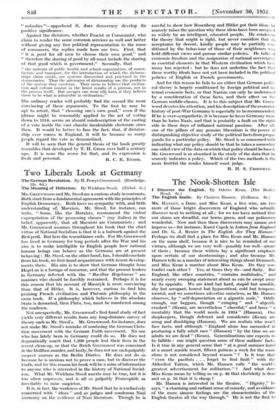Two Liberals Look at Germany The Meaning of Hitlerism. By
Wickham Steed. (Nisbet. 5s.) Ma. GREENWOOD and Mr. Steed are a curious study in contrasts. Roth start from a fundamental agreement withthe principles of English Democracy. Both have no sympathy with, and little Understanding of, Marxism. Mr. Steed, for instance, can write, " Some, hike the Marxists, recommend the violent expropriation of the possessing classes " (my italics) in the belief, apparently, that all Marxistg are Communists : and Mr. Greenwood assumes throughout his book that the chief virtue of National Socialism is that it is a bulwark against the Red periL But here the resemblance ends. For Mr. Greenwood has lived in Germany for long periods after the War and his aim is to make intelligible to English people how rational human beings can behave as the Germans are at present behaving : Mr. Steed, on the other hand, has, I should conclude from his book, no first-hand acquaintance with recent develop- ments there. His aim is to show that German thought from Hegel on is a farrago of nonsense, and that the present leaders in Germany infected with the " Bacillus Hegeleanus " are Inaniaes who should be forcibly restrained. Perhaps it is for this reason that his account of Masaryk is more convincing than that of Hitler. It is, however, curious to find - him praising French civilization and Platonic philosophy in the same book. If a philosophy which believes in the absolute State is demented, then Plato, too, must be numbered among the madmen.
Not unexpectedly, Mr. Greenwood's first-hand study of fact yields very different results from any long-distance survey of theory such as Mr. Steed's. Mr. Greenwood, for instance, does not make Mr. Steed's mistake of confusing the German Chris- tian movement with the German Faith movement. No one who has lately been in Germany could do so. He does not dogmatically assert that 1,200 people lost their lives in the recent clean-up, or that the Reich Government was concerned in the Dollfuss murder, and lastly, he does not nse such palpably suspect sources as the Berlin. Diaries. He does not do so .because he is anxious not to prove a case, but to discover the truth, and for this reason his book will be a mine of information to anyone who is interested in the history of National Social- ism. What Mr. Wickham Steed asserts may be true, but it is too often unproven, and is all so palpably Francophile as inevitably to raise suspicion.
It is, in fact, the weakness of Mr. Steed that he is exclusively concerned with " ideas?' and so judges and condemns Nazi Germany on the evidence of Nazi literature. Though he is
careful to show how Rosenberg and Hitler got their ideas, he scarcely raises the question why these ideas have been accepted so widely by an intelligent, educated people. He condemns the theory that might is right, but never considers that its acceptance by decent, kindly people may be partially con- ditioned by the behaviour of those of their neighbours It ho hold different views and pursue similar policies. He talks of economic freedom and the resignation of national sovereignty as essential elements in that Western civilization which Ger- many has rejected : but he does not underline the fact that these worthy ideals have not yet been included in the political policies of English or French governments.
And for this reason he fails to see either that German politi- cal theory is largely conditioned by foreign political and in- ternal economic facts, or that Nazism can only be understood by a consideration of these facts, and their effect on the German middle-classes. It is to this subject that Mr. Green- wood devotes his attention, and his description of the economic history of post-War Germany is especially to be recommended. If he is over-sympathetic, it is because he loves Germany more than he hates Nazis, and that is probably a fault on the right side in these days of inflamed national passions. After all one of the pillars of any genuine liberalism is the power of distinguishing objective study of the political facts from propa- ganda for a particular policy. Mr. Steed is so concerned with indicating what our policy should be that he takes a somewhat one-sided view of the data on which that policy should be based. Mr. Greenwood is so absorbed in the study of the data that he scarcely indicates a policy. Which of the two methods is the more fruitful the reader himself must judge;
R. H. S. CROSSMAN,










































 Previous page
Previous page